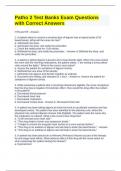-
1. Exam (elaborations) - Brs pathology all questions with correct answers
-
2. Exam (elaborations) - Cellular form and function test bank questions with answers
-
3. Exam (elaborations) - Ch 4&5 pathology review. end of chapter questions, test bank, rtbc with correct answe...
-
4. Exam (elaborations) - Chapter 1. intro to pathophysiology test bank exam questions with complete solutions
-
5. Exam (elaborations) - Chapter 7 test bank exam questions with verified answers
-
6. Exam (elaborations) - Comprehensive radiographic pathology- ch. 1 exam test guide questions and answers
-
7. Exam (elaborations) - Difs ~ pathology ii ~ test bank exam questions with complete solutions
-
8. Exam (elaborations) - Hemodynamic disorders review of pathology ch4 illustrated pathology review question b...
-
9. Exam (elaborations) - Mccance chapter 36 pulmonary test bank exam questions with correct answers
-
10. Exam (elaborations) - Pathology test 3 bank exam questions with verified answers
-
11. Exam (elaborations) - Pathology practice questions with latest update
-
12. Exam (elaborations) - Pathology chapter 4 - hemodynamic disorders, thromboembolic disease, and shock exam q...
-
13. Exam (elaborations) - which of the following is an example of a clinical manifestation known as a sign? a)...
-
14. Exam (elaborations) - Patho final (chapters 9, 14, 15 test bank) exam questions with correct answers
-
15. Exam (elaborations) - Patho 2 test banks exam questions with correct answers
-
16. Exam (elaborations) - Oral pathology exam test bank questions with latest update
-
17. Exam (elaborations) - Oral pathology chapter 1 review questions with correct answers
-
18. Exam (elaborations) - Pathology test bank - exam 1 practice questions with latest update
-
19. Exam (elaborations) - Pathology test bank 2420 midterm exam questions with complete solutions
-
20. Exam (elaborations) - Pathology test bank exam questions with erified answers
-
21. Exam (elaborations) - Pathophysiology chapter 5- test bank exam questions with latest update
-
22. Exam (elaborations) - Pathophysiology chapter 7- test bank exam questions with complete solutions
-
23. Exam (elaborations) - Pathophysiology chapter 16 - test bank exam questions with correct answers
-
24. Exam (elaborations) - Pathophysiology test 1 multiple choice section exam test guide questions and answers
-
25. Exam (elaborations) - Chapter 2 pathology review questions with answers
-
26. Exam (elaborations) - Chapter 8 nervous system test bank exam questions with verified answers
-
27. Exam (elaborations) - Chapter 11 reproductive test bank exam questions with &tab;complete solutions
-
28. Exam (elaborations) - Forestry test bank exam questions with latest update
-
29. Exam (elaborations) - Medical terminology test bank exam questions with correct answers
-
30. Exam (elaborations) - Microbiology test bank exam questions with latest update
-
31. Exam (elaborations) - Pathophysiology chapter 2- test bank exam questions and answers
-
32. Exam (elaborations) - Professionals in the pathology laboratory exam questions and answers
-
33. Exam (elaborations) - Quiz 1 pathology test guide with latest update
-
34. Exam (elaborations) - Rad review question bank with correct answers
-
35. Exam (elaborations) - Test bank chapter 7 exam questions with latest update
-
36. Exam (elaborations) - Test bank pathology- chapter 34 exam test guide questions and answers
-
37. Exam (elaborations) - Test bank pathology exam 1 questions with correct answers
-
38. Exam (elaborations) - Behavior pathology quiz 8 exam questions and answers
-
39. Exam (elaborations) - Chapter 6 epidemiology test bank exam questions with correct answers
-
40. Exam (elaborations) - Chapter 7 test bank exam questions with latest update
-
41. Exam (elaborations) - Cpc exam test bank exam questions with correct answers
-
42. Exam (elaborations) - Genetics chapter 24 test bank exam questions with latest update
-
43. Exam (elaborations) - Pathology chapter 5 gastrointestinal system exam test guide questions and answers
-
44. Exam (elaborations) - Pathophysiology chapter 14- test bank exam questions with &tab;verified answers
-
45. Exam (elaborations) - Plant pathology exam 1 questions and answers
-
46. Exam (elaborations) - Psych test 4 test bank exam questions with correct answers
-
47. Exam (elaborations) - Chapter 5 pathology of body fluids exam test guide questions and answers
-
48. Exam (elaborations) - Chapter 27 test bank exam questions with latest update
-
49. Exam (elaborations) - Comprehensive radiographic pathology chap. 4 exam questions and answers
-
50. Exam (elaborations) - General pathology - final exam (all questions) with correct answers
-
51. Exam (elaborations) - Gi patho final test bank exam questions with verified answers
-
52. Exam (elaborations) - Introduction to pathology exam review questions and answers
-
53. Exam (elaborations) - Ost247 procedural coding - 3-2-1 code review questions and answers
-
54. Exam (elaborations) - Pathology exam 1 (ch. 1-4) study guide questions with correct answers
-
55. Exam (elaborations) - Pathophysiology chapter 15 & 9- test bank exam questions with latest update
-
56. Exam (elaborations) - Pathophysiology exam #1 – porth review questions with correct answers
-
57. Exam (elaborations) - Systems pathology exam 3 review questions with complete solutions
-
58. Exam (elaborations) - Terminology word bank for gross pathology exam questions and answers
-
Show more




